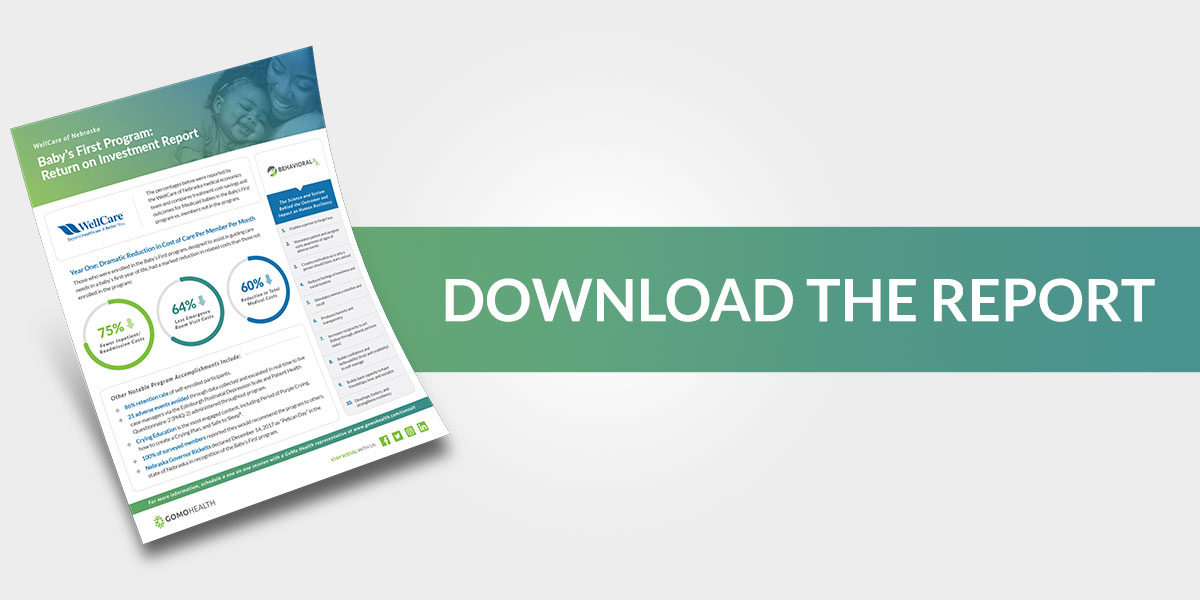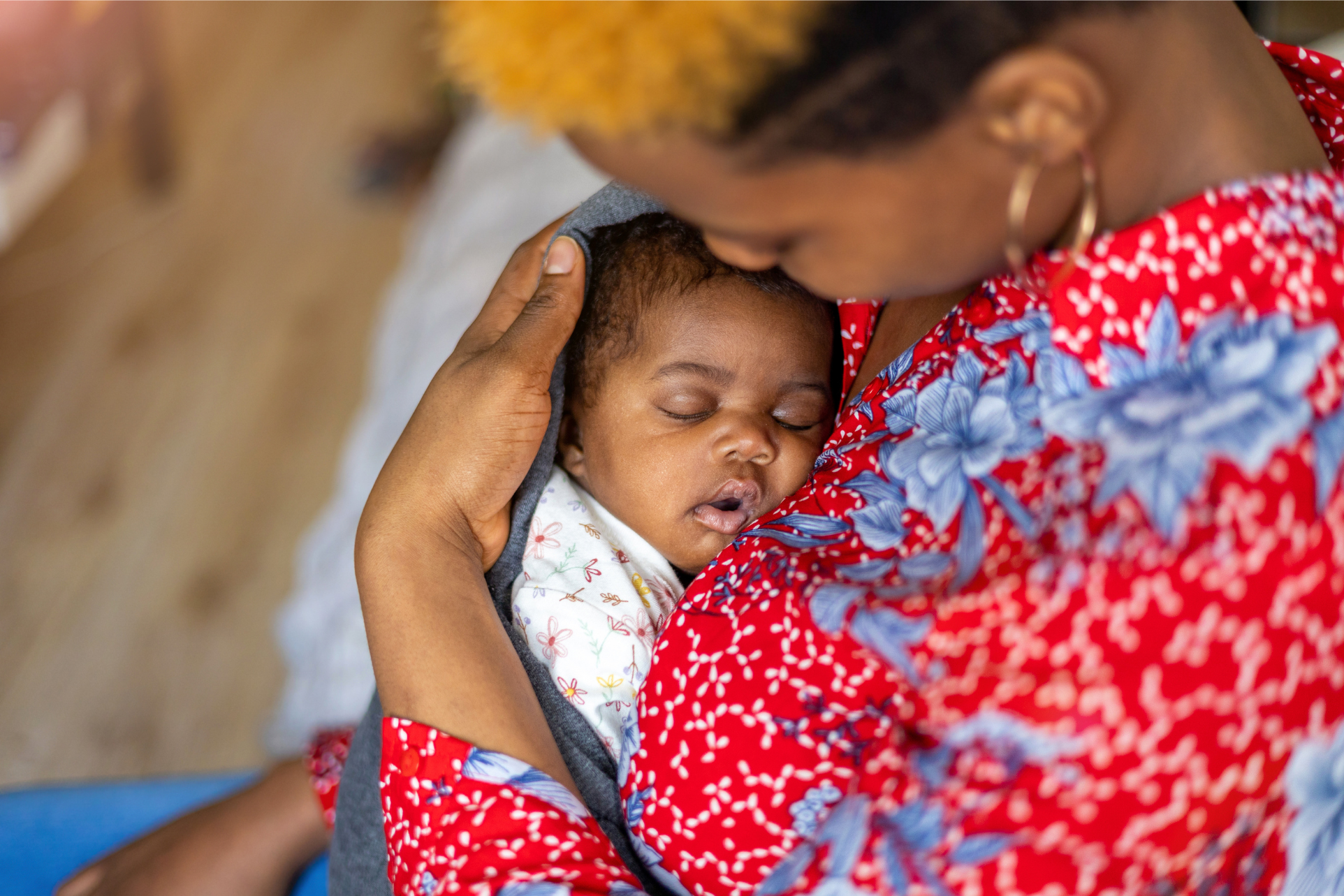Innovator of the Year 2017: Jessica Andersen, RN, BSN, CPHQ Quality Improvement Maternal Child Project Manager at WellCare Health Plans
The Innovator of the Year Awards are awarded annually by GoMo Health. We are proud to recognize those who work hard to transform the patient and provider experience, improve communications throughout the continuum of care, efficiently scale the support and care available to patients from their clinical care team, and increase provider Joy in Practice. Innovators can be employees of health plans, hospitals, health systems, or pharmacies and life sciences companies that exemplify:
- Out-of-the-box innovation, creation, and implementation of programs that meet the objectives listed above.
- Keen focus on program introduction, promotion, ease of access, and utilization.
- Collaborative program monitoring, identifying opportunities for ongoing improvements.
- Diligent gathering of patient reported outcomes to drive future initiatives.
Our 2017 Health Plan Innovator of the Year is Jessica Andersen, RN, BSN, CPHQ Quality Improvement Maternal Child Project Manager at WellCare Health Plans. Jessica is a Nebraska native, hailing from Bennington, NE, and a graduate of Clarkson College in Omaha, NE. She has an impressive work history in pediatrics, currently working as Maternal Child Project Manager at WellCare of Nebraska.
Jessica was instrumental in the creation and launch of the Baby’s First program, which was designed to help improve mother and infant health, reduce Shaken Baby Syndrome (SBS), and provide resources for those families in need.
We sat down with Jessica to discuss the Baby’s First program and how innovation has affected the patient population at WellCare of Nebraska.
GoMo Health: What do you think the special sauce is in pediatrics?
JA: I think it’s a willingness to be a little bit vulnerable, a lot of bit silly, and to get on the same level as the people that you are taking care of. In pediatrics, it’s a little bit different than anything else I’ve ever experienced. As a parent, when your child gets sick, you are in survival mode – it can be really scary. So, seeing those families come in to clinics… for the nurses and providers, it’s a lot about the kiddo, but it’s also a lot about the family unit and making sure that they feel secure, they feel safe, and they feel taken care of.
Tell us about a typical day for you – what is your main goal in your position as it relates to impacting patient care and outcomes and improving patient experience?
I think in healthcare, there’s not really a typical day!
My role is the Maternal Child Project Manager. I manage our performance improvement projects, which are through the state. The two that I work on right now are, first, making sure that moms who are pregnant get Tdap with every pregnancy because they can pass on that immunity to baby. Second, I work to make sure that moms that have a history of pre-term births know about a medication called Makena to hopefully prevent another preterm birth or at least carry the next baby closer to term.
We also have the Baby’s First program, and we just developed and rolled out [a program for] crying plans. We created a crying plan workshop with a video and a crying plan, the workshops are available to anyone in the state at no cost. You don’t have to be a WellCare member to participate, you just have to come to any of our Welcome Rooms in Nebraska.
One of the things I really like about WellCare is their support for the community that our members live in, so we’ve been able to do some unique things like offering Baby’s First and the Crying Plan Workshop to everyone in the state, not just WellCare members.
Your innovation and commitment to the patient experience and improving the healthcare journey, combined with your passion for what you do, has landed you this award for Innovator of the Year. What inspires you?
My favorite quote of all time is a Ralph Waldo Emerson quote, “To know even one life has breathed easier because you have lived. This is to have succeeded.” I think that is what I strive for in my career. I try to help as many people as I possibly can, and to me, that’s success. When I am able to do that, and I can see that in motion, I think that’s when I feel the most joy in my career and most excited. This program has been fantastic because I am able to reach so many more people than I would have been in any other realm of my nursing career.
On the Baby’s First program…
It sometimes feels like there is lots of support out there when you are pregnant and then the baby comes and you are just supposed to know everything about keeping this tiny human alive and safe. Unfortunately, it can be hard, confusing, and overwhelming. For many people, a little guidance and support is very welcomed and sought after – and that is what this program offers.
What was your thought and idea behind naming your program Baby’s First?
We had several meetings and there were numerous ideas tossed around, but one day we just knew it had to be “Baby’s First.” It really encompasses what we are doing and is a play on words. The program runs for the first 15 months of baby’s life, and we talk about all of these “first” things that are happening. The first steps that baby takes, the first time baby tries solids, the first developmental milestones, when baby starts cooing or talking or using sign language – all of those first things that happen in that 15-month period.
And then on the flip side of it, I think there’s a real movement in parenting around making a conscious effort to put your children first.
What are some of the interesting insights and learnings from implementing the Baby’s First program?
It honestly took me a little while to wrap my head around the technology that GoMo had to offer. It was unlike anything I had ever experienced in my nursing career up to that point. But, we got our WellCare team together and we meshed so well with the GoMo Health team that I think everything just really came together seamlessly – the GoMo team is fantastic to work with! Once we had a good concept of how the technology looked and how it could work, I think the end result is exactly what we were going for.
How does your Baby’s First program make things easier for you and your members?
Postpartum depression and behavioral health issues are getting more publicity now, if you’ve watched the trends in health news and health topics. I think more women feel able to talk about it now, and hopefully we continue to move in that direction. There is often this misconception that when the baby comes, everything is going to be bright, sunny, and joyous… but for a lot of moms that’s just not the case. One of the challenging things about postpartum depression it can be difficult to know if what you are experiencing is due to changes in hormone levels after delivery or if it is truly postpartum depression. That’s where screening tools can be very helpful!
I think it is a bit easier to complete an anonymous depression screen where you can provide honest answers from the comfort and security of your own home. Baby’s First offers the screening, gives you the results, and from there, if the score indicates postpartum depression, the user can either call the resource number provider or call their provider. We utilize a well-known, standardized depression screen and I think the anonymity of completing it has really led to honest answers.
How has Baby’s First been perceived as a tool to help you scale within the finite resources you may have?
When you take your kiddo in for a well visit, there’s so much information that’s talked about. All of these different topics and you walk away and you’re like, “What did they say? I don’t remember what they said.” I think the Baby’s First program has been an amazing tool because we pull from the same resources that pediatricians are using and giving parents. We’re just hitting on it multiple times to really drive the information home. And it’s in a text message, so you can pull that back up at a later time if you have more questions or forget something.
One of the unique things about the Baby’s First program is the input you had on the behavioral health side through the WellCare psychiatrist. With all of the talk today about treating the whole person, you don’t see that very often. How did this come together for Baby’s First?
Our team really wanted the program to address all aspects of parenting and you can’t really do that without considering the mental and emotional aspects of this adventure. For this reason, it was really important that we had a behavioral health expert on the team. Mental health is important to address, and I think the program does it really well. We’ve gotten great feedback from people that have used it and reported back that they really liked all of the encouragement and support along with the helpful tips and education.
WellCare made the decision to have not only its members participate, but a version of Baby’s First for any mom in Nebraska. How did that come about?
There is a saying that a rising tide lifts all boats, and I think that’s something WellCare really takes to heart. I think it’s a testament to how strongly WellCare feels about supporting not only our members, but also the community that our members are in.
Many thanks to Jessica for her hard work and dedication to the Nebraska community! To learn more about the Baby’s First program, click the button below.







Find Us Online